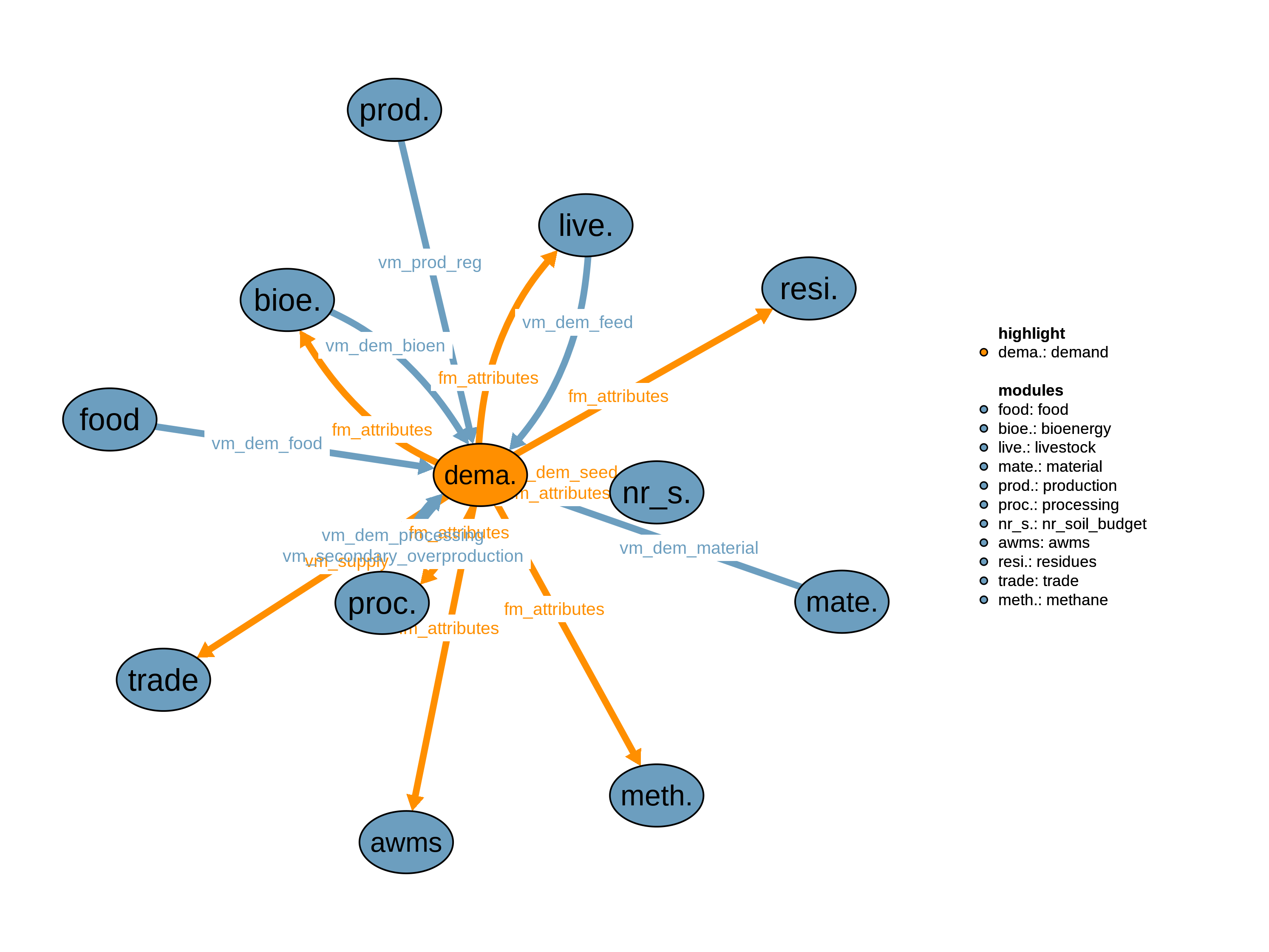The demand module calculates the demand for all commodities that has to be fulfilled by the model. In addition, it returns some other basic information needed for demand calculations but also needed by other modules. A description of food demand scenarios that enter the model can be found in Bodirsky et al. (2015), Bodirsky et al. (2012) and Valin et al. (2013).

| Description | Unit | A | |
|---|---|---|---|
| vm_dem_bioen (i, kall) |
Regional bioenergy demand | \(10^6 tDM/yr\) | x |
| vm_dem_feed (i, kap, kall) |
Regional feed demand including byproducts | \(10^6 tDM/yr\) | x |
| vm_dem_food (i, kall) |
Food demand | \(10^6 tDM/yr\) | x |
| vm_dem_material (i, kall) |
Demand for material usage | \(10^6 tDM/yr\) | x |
| vm_dem_processing (i, kall) |
Demand for processing use | \(10^6 tDM/yr\) | x |
| vm_prod_reg (i, kall) |
Regional aggregated production | \(10^6 tDM/yr\) | x |
| vm_secondary_overproduction (i, kall, kpr) |
Overproduction of secondary couple products | \(10^6 tDM/yr\) | x |
| Description | Unit | |
|---|---|---|
| fm_attributes (attributes, kall) |
Conversion factors - where X is ton N P K C DM WM or PJ GE | \(X/tDM\) |
| vm_dem_seed (i, kall) |
Demand for seed | \(10^6 tDM/yr\) |
| vm_supply (i, kall) |
Regional demand | \(10^6 tDM/yr\) |
In the sector_may15 realization, demand is calculated as the sum of demand for all products coming from the modules 62_material, 60_bioenergy, 70_livestock, 15_food and 17_production. It also delivers data to the modules 60_bioenergy, 21_trade, 20_processing, 18_residues, 55_awms, 50_nr_soil_budget, 32_forestry, and 53_methane.
Not all demands are relevant for each product group therefore we distinguish into diverse product groups and demand types, according to the equations below. Supply balance for crops, livestock, secondary products and crop residues are calculated as the summation of the corresponding demand for food, feed, processing products, material, bioenergy, seed, waste and the domestic balance flow. Demand for seed, waste and the domestic balance flow are calculated internally within the 16_demand module, while the other relevant demand values are taken from other modules (see interface plot).
\[\begin{multline*} vm\_supply(i2,kcr) = vm\_dem\_food(i2,kcr) + \sum_{kap4} vm\_dem\_feed(i2,kap4,kcr) + vm\_dem\_processing(i2,kcr) + vm\_dem\_material(i2,kcr) + vm\_dem\_bioen(i2,kcr) + vm\_dem\_seed(i2,kcr) + v16\_dem\_waste(i2,kcr) + \sum_{ct} f16\_domestic\_balanceflow(ct,i2,kcr) \end{multline*}\]
\[\begin{multline*} vm\_supply(i2,kap) = vm\_dem\_food(i2,kap) + \sum_{kap4} vm\_dem\_feed(i2,kap4,kap) + v16\_dem\_waste(i2,kap) + vm\_dem\_material(i2,kap) + \sum_{ct} f16\_domestic\_balanceflow(ct,i2,kap) \end{multline*}\]
\[\begin{multline*} vm\_supply(i2,ksd) = vm\_dem\_food(i2,ksd) + \sum_{kap4} vm\_dem\_feed(i2,kap4,ksd) + vm\_dem\_processing(i2,ksd) + v16\_dem\_waste(i2,ksd) + vm\_dem\_material(i2,ksd) + vm\_dem\_bioen(i2,ksd) + \sum_{ct} f16\_domestic\_balanceflow(ct,i2,ksd) \end{multline*}\]
\[\begin{multline*} vm\_supply(i2,kres) = \sum_{kap4} vm\_dem\_feed(i2,kap4,kres) + vm\_dem\_material(i2,kres) + vm\_dem\_bioen(i2,kres) + v16\_dem\_waste(i2,kres) + \sum_{ct} f16\_domestic\_balanceflow(ct,i2,kres) \end{multline*}\]
Supply balance pasture is calculated as the regional feed demand for pasture.
\[\begin{multline*} vm\_supply(i2,"pasture") = \sum_{kap4} vm\_dem\_feed(i2,kap4,"pasture") \end{multline*}\]
Waste demand is calculated as the regional demand of all commodities multiplied by the corresponding waste share and summed up with the overproduction of secondary couple products.
\[\begin{multline*} v16\_dem\_waste(i2,kall) = vm\_supply(i2,kall) \cdot \sum_{ct}f16\_waste\_shr(ct,i2,kall) + \sum_{kpr}vm\_secondary\_overproduction(i2,kall,kpr) \end{multline*}\]
Seed demand is calculated as the regional aggregated production of all commodities multiplied by the corresponding seed share.
\[\begin{multline*} vm\_dem\_seed(i2,kcr) = vm\_prod\_reg(i2,kcr) \cdot \sum_{ct}f16\_seed\_shr(ct,i2,kcr) \end{multline*}\]
Timber demand is calculated based on population and income. End use product demand is aggregated to timber products of first processing stage i.e., wood and wood fuel.
\[\begin{multline*} vm\_supply(i2,kforestry) = vm\_dem\_material(i2,kforestry) \end{multline*}\]
Limitations There are no known limitations.
| Description | Unit | A | |
|---|---|---|---|
| f16_domestic_balanceflow (t_all, i, kall) |
Balance flow for inconsistencies between domestic supply and use in FAO | \(10^6 tDM/yr\) | x |
| f16_seed_shr (t_all, i, kcr) |
Seed share relative to production from FAO-FBS | \(1\) | x |
| f16_waste_shr (t_all, i, kall) |
Waste share relative to domestic supply from FAO-FBS | \(1\) | x |
| q16_seed_demand (i, kcr) |
Seed demand | \(10^6 tDM/yr\) | x |
| q16_supply_crops (i, kcr) |
Supply balance of crops | \(10^6 tDM/yr\) | x |
| q16_supply_forestry (i, kforestry) |
Forestry demand | \(10^6 tDM/yr\) | x |
| q16_supply_livestock (i, kap) |
Supply balance of livestock | \(10^6 tDM/yr\) | x |
| q16_supply_pasture (i) |
Supply balance of pasture | \(10^6 tDM/yr\) | x |
| q16_supply_residues (i, kres) |
Supply balance of crop residues | \(10^6 tDM/yr\) | x |
| q16_supply_secondary (i, ksd) |
Supply balance of secondary products | \(10^6 tDM/yr\) | x |
| q16_waste_demand (i, kall) |
Waste generation | \(10^6 tDM/yr\) | x |
| v16_dem_waste (i, kall) |
Demand for waste | \(10^6 tDM/yr\) | x |
| description | |
|---|---|
| attributes | Product attributes characterizing a product (such as weight or energy content) |
| ct(t) | Current time period |
| factors | factors included in factor requirements |
| i | all economic regions |
| i2(i) | World regions (dynamic set) |
| iso | list of iso countries |
| j | number of LPJ cells |
| k(kall) | Primary products |
| kall | All products in the sectoral version |
| kap(k) | Animal products |
| kcr(kve) | Cropping activities |
| kforestry(k) | forestry products |
| kli_rd(kap) | Ruminant meat and dairy products |
| kli(kap) | Livestock products |
| kpr(kall) | Products that can be processed |
| kres(kall) | Residues |
| ksd(kall) | Secondary products |
| kve(k) | Land-use activities |
| scen_watdem_nonagr | Scenarios for non agricultural water demand |
| scen42 | Environmental Flow Policy (EFP) |
| t_all(t_ext) | 5-year time periods |
| t(t_all) | Simulated time periods |
| type | GAMS variable attribute used for the output |
| w | Water supply type |
| wat_dem | Water demand sectors |
| wat_src | Type of water source |
| watdem_ineldo(wat_dem) | Exogenous water demand subset covering humanly induced demands |
| wtype | Water abstraction type |
Isabelle Weindl, Benjamin Bodirsky, Jan Philipp Dietrich.
15_food, 17_production, 18_residues, 20_processing, 21_trade, 50_nr_soil_budget, 53_methane, 55_awms, 60_bioenergy, 62_material, 70_livestock